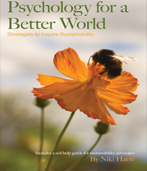

Title: Psychology for a Better World: Strategies to Inspire Sustainability
autores
: Niki Harré
Reviewed by Judah Viola, PhD
I strongly recommend Nikki Harré’s book for all community-minded academics and advocates who are curious about how to apply psychological theory and research to address real world concerns. Within the text, the reader will find many strategies to inspire others to make a difference. The entire text is derived from research clearly and artfully presented in the form of case examples and stories. Harré’s writing flows seamlessly from how to frame your thinking about sustainability, to tips on building a movement.
In this book, Harré culls literature from a variety of disciplines (e.g., social psychology, perception, community psychology, positive psychology, cross cultural psychology, learning and development etc…), making clear for the reader how recent developments in research and theory can be interpreted and applied to sustainability at the individual, group, and systems levels.
Harré’s book is at once credible and appropriately cited for academics as well as accessible for a lay audience. The values and perspectives in the book are presented clearly and honestly. The format is consistent and easy to follow: beginning with personal connections or stories to illustrate each issue, followed by a presentation of research on an array of topics, and concluding with concrete examples of how to apply these findings or concepts to sustainability work.
The broad and practical scope of this book can be appreciated from the chapter headings in the Table of Contents:
A particular high point in the text is the strong argument Harré makes, emphasizing the importance of encouraging creativity and commitment to solve our society’s toughest challenges.
Another great strength of the book is Harré’s ability to hold two ideas in tension at once. For example, Harré makes the case for the benefits of increasing positive states while decreasing fear and anxiety-inducing states. Yet she avoids over-simplifying the issue, and emphasizes the benefits and drawbacks to both types of psychological states and even discussing optimal ratios of these positive and negative states for individuals and groups.
Harré reminds us of the skill and frequency with which humans learn by copying one another. Then she expands on how this knowledge can be applied in community settings to encourage sustainability. She does this by presenting findings from research areas such as both modeling throughout the lifespan and social psychological factors such as normative influence.
She also reminds us of the power of stories, and provides concrete suggestions for how to apply all of the concepts in the chapter to our work toward greater sustainability. Also consistent with our field of community psychology the section on keys to identities reminds us of the interplay between our actions and our identities as well as our need for affiliation and a fundamental, interdependent sense of community.
The publishing of this book is both innovative and timely. Consistent with Harré’s values, evident throughout the text, there are free downloadable electronic copies of the book available at: http://www.psych.auckland.ac.nz/uoa/home/about/our-staff/academic-staff/niki-harré/psychologyforabetterworld. There are also reasonably priced paperback versions available on the website.
Judah Viola, PhD
Judah Viola is an Associate Professor at National Louis University, and Co-Director of the Community Psychology PhD program.
agregar comentario
palabras clave: gjcpp, community psychology, Sustainability, Positive Psychology, Advocacy, cp book review